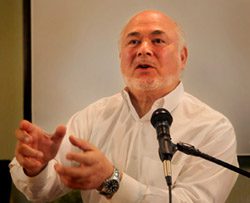![]()
 Ambassador Thomas Graham was recently featured on Fox Television with Niel Cavuto and wrote an article for Ambassadors Perspectives.
Ambassador Thomas Graham was recently featured on Fox Television with Niel Cavuto and wrote an article for Ambassadors Perspectives.
Watch Ambassador Graham’s Interview on Fox
Read Ambassadors Perspectives article “Iran: The Course Ahead” (text below)

Jonathan Granoff has recently been featured on the front page of the Huffington Post.
Read Huffington Post article “Iran: All Options On the Table?” (text below)
 Alyn Ware was recently on New Zealand National Radio
Alyn Ware was recently on New Zealand National Radio
Listen to Alyn Ware’s interview on New Zealand National Radio
Iran: The Course Ahead
Thomas Graham, Jr. (Special Representative of the President for Arms Control, Nonproliferation and Disarmament, 1994-1997)
Iran has been pursuing a nuclear program for nearly four decades. It began when the Shah was in power, was initially not continued by the Islamic Republic but by the late 1980’s was resumed again in earnest. Iran has been a party to the Nuclear Non-Proliferation Treaty (NPT) since 1970. It was publically revealed in 2002 that for many years Iran, contrary to its NPT Safeguards Agreement, had been clandestinely importing centrifuge enrichment technology purchased from the Pakistani rogue nuclear proliferator A.Q. Khan and was secretly constructing a large uranium enrichment facility at Natanz along with a plutonium-producing heavy water reactor at Arak. Natanz has been in active production now for a half a dozen years and has produced sufficient nuclear power reactor fuel which if over time upgraded to weapons level could fuel perhaps several crude weapons.
The International Atomic Energy Agency found Iran to be in violation of its NPT Safeguards Agreement in 2003 but Iran asserted that its program was one of peaceful nuclear power production, permitted by NPT Article IV. Years of inconclusive negotiations followed, first with the European Union, then with the permanent members of the UN Security Council plus Germany. However, the Iranian program for a long time has been under the control of the Revolutionary Guards force, belying its peaceful character and strongly suggesting that it is a military program aimed at weapons or at least a nuclear weapon capability. Iran has one functioning nuclear power reactor, Russian built and fueled and has no need of large enrichment facilities. A second, smaller enrichment plant, built deep underground on a Revolutionary Guards base located near the holy city of Qom, was publically revealed in 2009.
Israel has been asserting publically for some time that, despite the possession of a large nuclear weapon arsenal itself and with any possible plans for, or timing of, a significant Iranian weapon capability speculative and uncertain at this time, the Iranian program represents an “existential” threat to Israel with the window for possible military action rapidly closing. Iran has been subjected to four UN Security Council sanctions resolutions, with international sanctions growing ever stronger and tighter to the point of threatening to seriously damage, if not break, the Iranian economy. Several successful sabotage operations against the Iranian program have been carried out. Iran recently agreed to renew negotiations, dormant for a year.
Some believe that Israel is attempting to extract a pledge from the United States that if Israel forgoes military action against Iran now the United States will undertake it later if negotiations fail to stop the program. Much of President Obama’s domestic opposition appears to support favorable consideration of military action with the U.S. Presidential election only eight months away. Reportedly the Pentagon is preparing military options. What is the best course of action?
It is not military action. An Israeli strike–for which the US would inevitably be blamed–would be sufficient to rally Iranian domestic political support behind the regime but insufficient to cripple the nuclear program. A U.S. attack would of course be different. But a military strike by the United States would not be consistent with U.S. membership in the NPT regime and it would be contrary to international law without an authorizing Security Council resolution, in that no immediate threat justifying a preemptive attack exists. There would be significant and unpredictable retaliation by Iran. Iran is a large country in both area and population with a considerable military capability. Commencing hostilities with such a country would be very much subject to the question put by General Petraeus as he rode into Iraq in April, 2003, “Tell me how this ends.” If there is one thing that the United States must have learned from the Iraq misadventure is that war comes with very difficult to predict consequences, is costly and dangerous, and should be avoided if at all possible.
Rather the United States should be patient and urge patience on Israel. Iran is years away from a deliverable weapon if it ever has one and Israel has a powerful nuclear deterrent. Iran is under increasing pressure from sanctions; there could be a breaking point. Sabotage measures can be employed. Iran understands that proliferation of nuclear weapons to Saudi Arabia–which will surely happen, given the Saudi relationship with Pakistan, as a result of an Iranian weapon–is not in its interest. Calm, steadfastness and clear-headed policy can still win the day and lead to an acceptable solution of this difficult and dangerous problem.
Iran: All Options on the Table?
Jonathan Granoff
We hear a great deal of bravado on the best way to respond to the international security threat posed by Iran. The mantra of having “all options on the table” should include the many options beyond just increased sanctions and military force.
It would be very dangerous for Iran to develop nuclear weapons. Moreover, by flouting Security Council resolutions that demand suspension of all uranium enrichment and reprocessing activities, Iran undermines respect for international law and erodes confidence in diplomacy. It generates fear in its neighbors, particularly Israel, which in turn threatens violence.
To move away from this dangerous and unstable situation, both Israel and Iran must obtain security. If either feels threatened, progress toward security will be hard to obtain.
First, we must be clear on our goals. US policy is designed to change Iran’s behavior regarding its uranium enrichment program and not overturn its government. Iran is a legitimate state, no matter how distasteful its system of government is to us.
Second, we must be clear on our language. While the US would not use nuclear weapons against Iran, there are plenty of Iranians (and others in the world) who aren’t so sure. President Obama, and US military leaders, are quite aware that the horrific impact of nuclear weapons on massive numbers of innocent people and their infliction of unnecessary suffering beyond legitimate military objectives takes these weapons off the table. The failure to unequivocally exclude the use of nuclear weapons from being “on the table” allows others to distort our policies, values and norms.
Our military leaders are expressing far more reasonable positions than we hear daily on the campaign trail. General Martin Dempsey, Chairman of the US Joint Chiefs of Staff, said categorically that he did not consider the Iranian nuclear program an existential threat posed by irrational actors. He went on to say that an Israeli attack would “not be prudent.” What the public rarely hears is the strong support from US military leaders of arms control instruments that have consistently enhanced US and international security interests.
Third, we must be thorough about options, including the already-existing agreement to pursue an “effectively verifiable Middle East zone free of weapons of mass destruction (WMD), nuclear, chemical and biological, and their delivery systems.” Such a zone was agreed upon by 187 countries that are party to the Non-Proliferation Treaty. Later this year, through coordination with the UN, the US, Russia and the UK, Finland will host a conference to begin the creation of this WMD-free Middle East. There are already five such zones, encompassing 114 nations in nuclear weapon-free regional zones.
Israel supports this goal, but insists that comprehensive regional peace is a pre-requisite. Egypt and others insist that such a comprehensive peace requires the establishment of the zone. This “peace first” versus “disarmament first” polarization gets us nowhere. Both processes should be taking place at the same time.
Another option that could materially improve the current situation is reviving the arrangement brokered by Turkey and Brazil last May, rejected at the time by the US, wherein Iran would transfer low enriched uranium in exchange for enriched uranium for medical isotopes.
There could also be a boundary on Iran’s nuclear program that would keep its domestic enrichment to no more than 5%. Strict safeguards against nuclear weapons development would have to be tied to reducing sanctions. To achieve such progress in this manner, Iran would have to stop any further threats, of any nature, against the peace and security of Israel.
In the lead up to the Iraq war, the voices of its opponents were largely ignored by the media. Now, as the drumbeats for war on Iran increase, we who espouse effective, security-enhancing, non-military conflict resolution options must not be similarly ignored. It is time that our leaders and our media also put these options on the table.
Follow Jonathan Granoff on Twitter: www.twitter.com/GSInstitute
![]()






